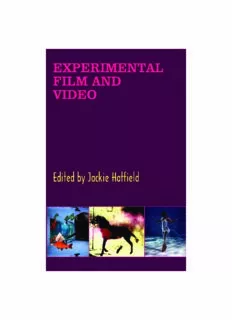
Experimental Film and Video: An Anthology PDF
Preview Experimental Film and Video: An Anthology
Experimental Film and Video ‘Nothingthathaseverhappenedshouldbe regardedaslost for history…Toarticulatethe past historically…means to seize hold of amemoryasit flashesup atamoment of danger.Onlythat historianwillhave thegiftoffanningthespark ofhope in thepast who is firmlyconvincedthateventhedeadwillnotbe safe from theenemyif he wins.’ WalterBenjamin ‘Thesesonthe PhilosophyofHistory’,page 247 Illuminations,(London: Pimlico,1999) Experimental Film and Video An Anthology Edited by Jackie Hatfield Picture Editor: Stephen Littman British Library Cataloguing in Publication Data ExperimentalFilmandVideo:AnAnthology AcatalogueentryforthisbookisavailablefromtheBritishLibrary ISBN:9780861966646(Paperbackedition) Publishedby EbookeditionISBN:9780-86196-906-7 JohnLibbeyPublishing,Box276,EastleighSO505YS,UK e-mail:[email protected];website:www.johnlibbey.com Orders:BookRepresentation&[email protected] Ebookeditionpublishedby JDoihstnribLuitbebdeiynPNuobrtlhisAhimnegriLcatdb,y3InLdeiiacneasteUrnRivoeardsi,tNyPewresBsa,r6n0e1t,NHoerrthtsMEoNr5to5nESWt,B, loomington, IN47404,USA.www.iupress.indiana.edu UnitedKingdom eD-imstariibl:[email protected];evwieerbAsiutest:rwalwiaw, 3.j0o–h5n2liSbmbeidym.coomreStreet,Marrickville NSW2204, Australia.www.elsevier.com.au PDriisntrtiebdutaenddineleJacptraonnbicybUonoikteodrdPeurbsli(sWheorrsldSwerivdiec)e:sILntddi,a1n-a32U-5niHveigrsaisthyi-Pshriensasg,awa, HSheinrmagaanwBa-kWu,eTllsokLyiobr1a4ry0-–0030520,,[email protected],oB.jlpoomington,IN47405,USA www.iupress.indiana.edu ©2006CopyrightJohnLibbeyPublishing.Allrightsreserved. Unauthorisedduplicationcontravenesapplicablelaws. ©2015CopyrightJohnLibbeyPublishingLtd.Allrightsreserved. UPrninatuetdhionriMseadladyusipalibcyatVioivnarcoPnritnrativnegneSsdnap.pBlhicda.,b4le8l0a0w0s.Rawang,SelangorDarulEhsan. Contents Contents Foreword by Sean Cubitt viii Foreword by A.L. Rees x Introduction JackieHatfield xii SECTION I Philosophies and Critical Histories of Avant-Garde Film and Current Practice 1 Chapter1 PostFuturePastPerfect GrahameWeinbren 3 Chapter2 Matter’sTimeTimeForMaterial PeterGidal 18 Chapter3 FilmsandInstallations–ASystemsViewofNature ChrisWelsby 26 Chapter4 ALineThroughMyWork NickyHamlyn 36 Chapter5 AFewNotesonFilmmaking JayneParker 47 Chapter6 FilmNoiseAesthetics RobGawthrop 53 Chapter7 LineDescribingaConeandRelatedFilms AnthonyMcCall 61 SECTION II Languages of Representation in Film and Video: Thresholds of Materiality 75 Chapter8 TrilogicalDistractions LisRhodes 77 Chapter9 The‘autoethnographic’inChantalAkerman’sNewsfromHome, andanAnalysisofAlmostOutandStagesofMourning SarahPucill 83 Contents Chapter10 Film,TheBody,TheFold AnInterviewwithNinaDaninoonNowIAmYours NinaDaninoandSusannaPoole 93 Chapter11 Attitudes1-8 KatherineMeynell 102 Chapter12 VideoWorks1973–1983 DavidCritchley 107 Chapter13 EarlyVideoTapes1978–1987 ChrisMeigh-Andrews 113 Chapter14 AndrewKötting.Whathedoes,howhedoesitandthecontextin whichithasbeendone:AnAlphabetariumofKötting GarethEvansandAndrewKötting 126 Chapter15 ArdentforSomeDesperateGlory:RevisitingSmotheringDreams DanielReeves 137 Chapter16 WarStories,orWhyIMakeVideosAboutOldSoldiers CateElwes 151 Chapter17 MovingParts:TheDivergenceofPractice VickySmith 163 SECTION III Philosophies and Critical Histories of Video Art to Cinema 169 Chapter18 MutationonaForm KarenMirzaandBradButler 171 Chapter19 Video:Incorporeal,Incorporated StephenPartridge 180 Chapter20 TamaraKrikorian–DefendingtheFrontier CateElwes 190 Chapter21 AnotherPlace–DavidHall JackieHatfield 200 Chapter22 Alchemy andtheDigitalImaginary DavidLarcher,interviewedbyStephenLittman 212 Chapter23 ReflectionsonMyPracticeandMediaSpecificity MalcolmLeGrice 220 Chapter24 ExpandedCinema–Proto, Post-Photo JackieHatfield 237 Chapter25 ImageConText(1978–2003):Film/Performance/Video/Digital MikeLeggett 246 SECTION IV Images 263 WorkbyGeorgeBarber,JackieHatfield,StephenHawley, TinaKeane, TamaraKrikorian,StephenLittman, JoAnnMillet,WilliamRaban, KaylaParker,GuySherwin,TonySinden,JohnSmith, JeremyWelsh Forewords Foreword by Sean Cubitt ForewordbySeanCubitt There have been honourable exceptions like Mike O’Pray and StephenHeath,butfewof the leadingfilm criticsand theorists of the last forty years have spent much time with artists’ video andfilm.Thoughfilm-makerLauraMulvey’sessayonvisualpleas- ure remains one of the most cited in the humanities, her films are more and more rarely screened in graduate classes. The demands of genre study, narratology and industrial analysis of national cinemas have led media scholars away from their interests in the avant-garde;whiletheavant-garde,especiallyintheUnitedKing- dom, have been driven further away from media-based funding towards thegalleryworldorthedigitalunderground. Politicalradicalism is notthecauseofthis:radicalslikeKenLoach canstillmakefeaturefilms.Butitmaybearesultofmarginalisation by the film business and increasingly by funding agencies whose brief must stretch from popular entertainment to documentary intervention and grassroots training. Everybody has a reason to stepaside. Yet there is a powerful tradition of artists’ writings on vanguard media practice in the UK. The writings of Peter Gidal and Stuart Marshall informed many young artists’ projects throughout the 1970sand1980s,sometimesasinspiration,sometimesinreaction, a constant articulation with emerging practices in film and video arts. The fabled inarticulateness of the creator was never much prized among film and video makers: talk was always integral to the art where making relied so heavily on other people’s help. I remember a New York based avant-garde filmmaker amazed that his LondoncrewonajobbingmusicvideowereallreadingKafka andgoing off to Fassbinder screenings.Theartschooltradition of demandinga writtendissertationaspartof thedegreestillimpacts on the distinctive willingness of the UK artist to engage in ideas, and to generate them. For lack of a continuous tradition of critical writing – despite the effortsofUndercutoverthe years–thiscollectionislikelytoprove atreasuretrovefornewreaders.Piledupinone-offlittlemagazines and catalogues, mimeographed sheets and letraset layouts are the vviiiiii fragments of a thriving culture swept under the carpet of history Foreword by Sean Cubitt byasadconfusionofmissedopportunities,crossedwires,confused responsibilitiesandovercrowdedarchives.Giventhetechnological savvyofitspractitioners,filmandvideoartintheUKhasbeenfor the most part an oral culture, and every time one of its old guard dies,liketheAfricanadageaboutfathers,itislikealibraryhasburnt down. These were not theories in the sense of coherent discourses groundedinaxiomsandbuiltbrickbybrickastheoremsandtheses. They were assertions, political manifestos, memos from cutting roomsandgalleryfloors.Theyspokefromthedeliriumofgreeting a newmachine–theFilmCoop’slegendaryopticalprinter, LVA’s firstnon-linearsuite.Somecomefromthelost agesof16mm film and monochrome television. Whole aesthetics have evaporated sincevideomigratedfromopenreelstocassettes,astheydidwhen television and shortly thereafter video migrated to colour. The possibilitiesforinventionwerenolessthen,thoughthepalettewas perhaps more limited – just as Dürer’s prints are scarcely poor comparedtohis oils. Despiteeverything,thediscourseisstillinhocktothegodsoftime: progress and fashion still rule the ways younger artists approach older art. The voices seem faded and stilted perhaps, the concerns remoteandoldhat.Mostofall,ofcourse,thereisscarcelyanything availabletothemortheirteachersoftheroarandshoveoftheCoop and LVA, or the irrational passions that drove regional initiatives intheSouthWest,theEastMidlands,HullandLiverpool.Startling loyalties and antagonisms between film and video folk, strange destinies each pursued often separate from the other. Odd allies that emerged from the British Council and Canada House when the national collections found it impossible to buy or archive the cultureofartists workinginthe movingimage. This Anthology, Experimental Film and Video, is one of a number ofmovesto reinstate alost history.Itdoesso notonlytosecurea pensionforunjustlyneglected artists,notonlytofillablank in the annals of the culture; nor even to bring an era of extraordinary achievement in the arts back into public view. Most of all, the Anthologyexistsinabroaderactiontobringtotheemergentartists ofthe21stcenturysomeflavourof thepioneersofthe 20th.Great as they were, Picasso, Duchamp and Pollock are poor masters for artists whose media move in time, make noises, connect to net- works.Insomewaystheonlygenuinelynativeavant-gardemove- ment of the 20th century in the UK, the film and media avant-gardesof the1960s,70sand80ssetthegroundworkforthe emergent digitalarts. These storiesarealive and infectious. SeanCubitt iixx March2005
Description: